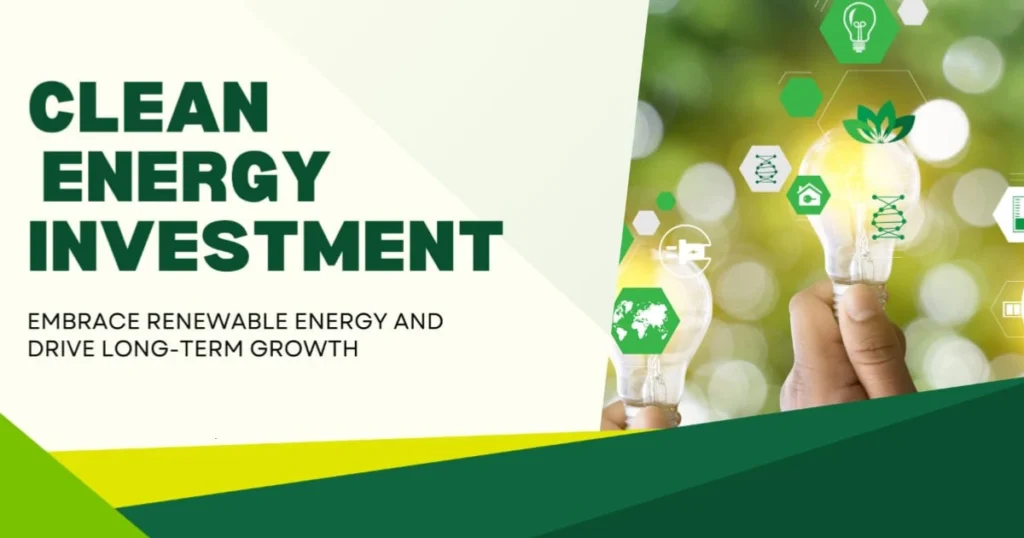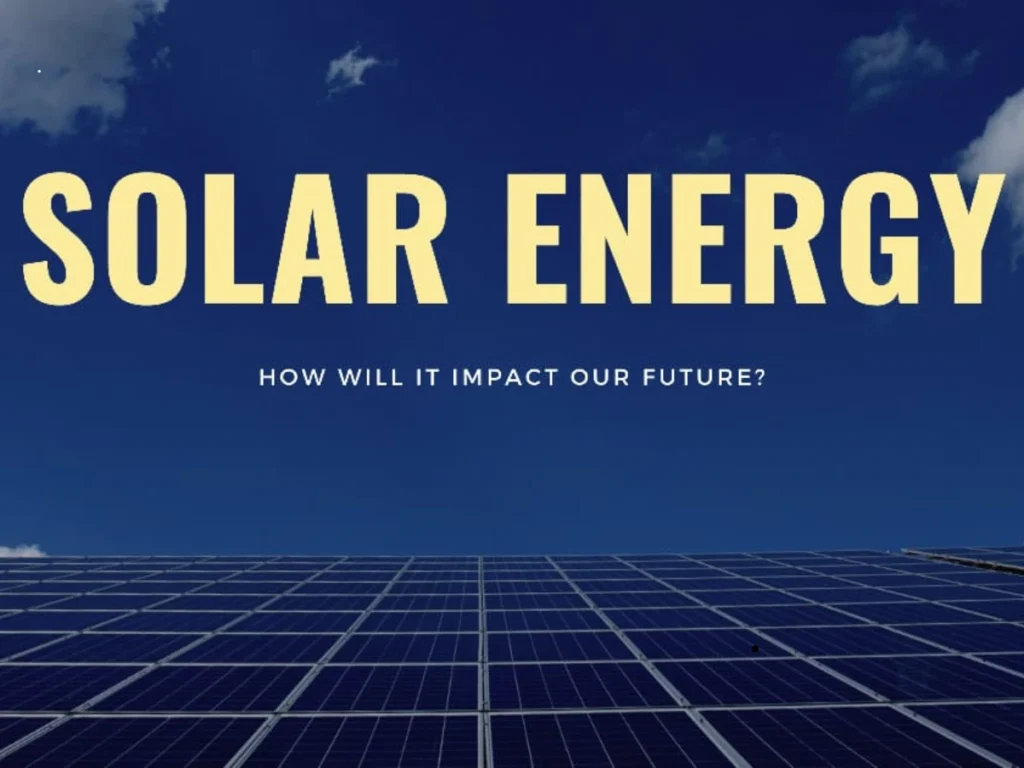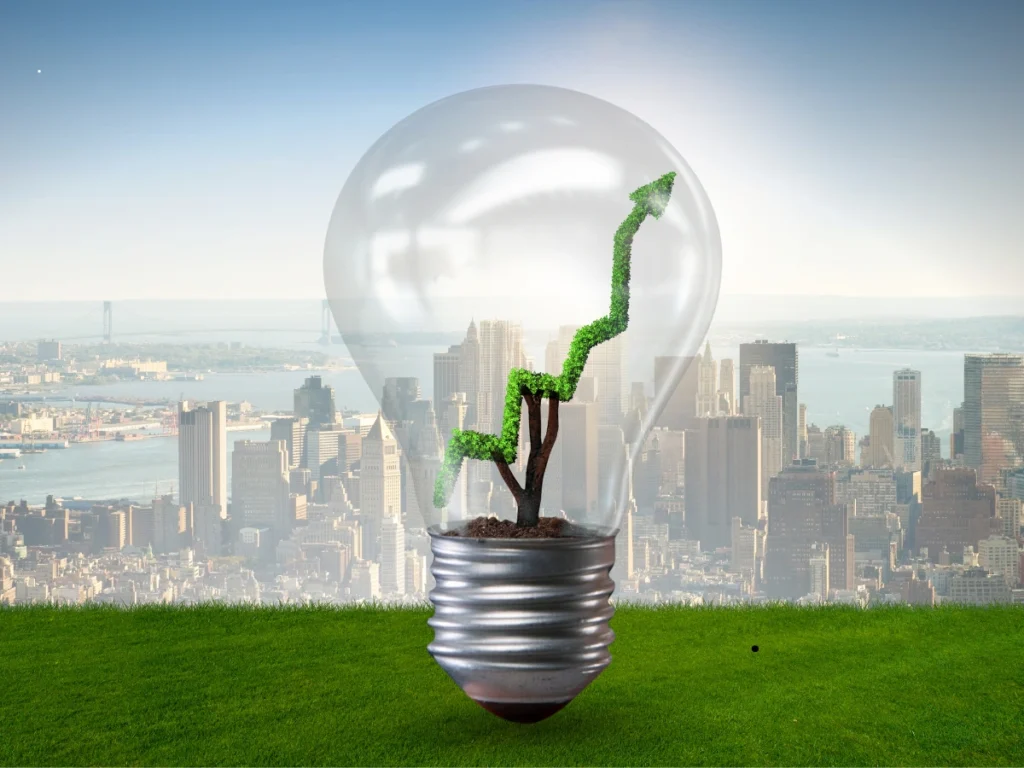
Clean energy investment has emerged as a powerful avenue for individuals seeking to align their financial goals with environmental responsibility. It allows individuals to support environmental sustainability while pursuing profitable ventures. The clean energy sector encompasses various technologies like solar, wind, and energy storage. These options cater to different investment preferences and risk tolerances. Since they don’t contribute to air pollution, energy-saving methods and green power resources are both considered clean energy sources.
The environmental advantages of clean energy in the context of a global energy future are the most significant feature. Clean, renewable resources not only protect the planet’s natural resources but also lessen the likelihood of environmental catastrophes like fuel spills and the issues brought on by natural gas leaks. Fuel diversification makes it feasible to generate dependable power supplies to improve energy security and make sure there is enough to meet our demands by utilizing several power plants that use diverse energy sources.
Moreover, clean energy investment is not just about supporting eco-friendly initiatives; it is increasingly becoming a smart financial decision. As governments worldwide implement policies to incentivize renewable energy adoption and phase out fossil fuels, the clean energy market is experiencing rapid growth and innovation.
Strategic Advantages of Clean Energy Investment
This trend is creating a fertile ground for investors to capitalize on the transition to a low-carbon economy. By carefully selecting clean energy investment, individuals can position themselves to benefit from long-term industry growth, potentially outperforming traditional energy investments in the years to come.
Furthermore, they provide valuable portfolio diversification. This can help mitigate overall investment risk and enhance financial stability. As the world transitions to a low-carbon economy, clean energy investment stands out as a promising path for personal financial advancement.
Individual’s Clean Energy Investment Options

Individuals can utilize a variety of clean energy options to lower their carbon footprints and lower their energy expenses.
- Wind energy
- Solar energy: You can check out some economical Solar Panel options by clicking the link below:
- ECO-WORTHY 400W Solar Panels 4pcs 100 Watt 12 Volt Monocrystalline Solar Panel Module for Off Grid PV Power for Home, Camping, Boat, Shed Farm, RV
- Renogy 400 Watt 12 Volt Premium 4 Pcs 100W Panel+40A MPPT Charge Controller+ Bluetooth Module Fuse+ Mounting Z Brackets+Adaptor Kit +Tray Cables Set, 400W, Grid 12V Solar Power System
- Geo-thermal energy
- Hydropower
- Bioenergy
Clean Energy in the United States
The green power industry in the United States continues to grow, and this is an indicator of the state-wide green power transformation.
The green power industry is going to keep expanding steadily in the years ahead, producing hundreds of billions in revenues. Preserving America’s standing as the global leader in green power requires the careful utilization of all of its abundant energy assets, particularly nuclear, geothermal, wind, water, solar, and bioenergy. You can also watch the Energy Secretary Granholm: There’s been $500B worth of investment in clean energy since IRA passage or watch below:
The Inflation Reduction Act and Bipartisan Infrastructure Law
Two pieces of law that aim at tackling climate change and promoting clean energy resources in the US are the Bipartisan Infrastructure Law (BIL) and the Inflation Reduction Act (IRA). They support a few major clean energy programs and ideas; the Inflation Reduction Act (IRA) focuses on investment tax credit, home energy rebate programs, manufacturing and clean energy booms, and renewable energy deployment. The Infrastructure Investment and Jobs Act (IIJA), also known as the Bipartisan Infrastructure Law (BIL), tackles transportation, clean water, broadband internet, and climate resilience.
Clean Energy Manufacturing
The production of tools that boost energy use or produce clean energy is the primary goal for the growing clean energy manufacturing sector. This includes the production of energy-efficient appliances, wind turbines, solar panels, and batteries for electric vehicles. The U.S. Department of Energy’s Clean Energy Manufacturing Initiative (CEMI) aims to boost the country’s efficiency in this field by promoting technology and removing market obstacles.
Impact of clean energy in numerous aspects at present times
Clean energy investment has emerged as a crucial element in global strategies aimed at addressing environmental issues, enhancing sustainability, and promoting economic growth. Converting from traditional to renewable energy resources is a crucial step. This is particularly important considering the impact of climate change, environmental deterioration, and the limited availability of non-renewable resources.
Ecological Impacts and Eco-savvy
Compared to traditional fossil fuels, clean energy resources like wind, solar, geothermal, and hydropower usually have more beneficial ecological impacts. By crucially Reducing greenhouse gas emissions and utilizing clean energy resources can mitigate the impact of climate change. Renewable resources, except for coal and natural gas, do not produce carbon dioxide or other harmful pollutants that pollute the environment. This transformation leads to reduced air and water pollutants, which directly affect general health and biodiversity.
Financial Benefits
Financially, the transition to clean energy investment offers a multitude of benefits. Clean energy sources generate financial growth, lower energy prices, and create jobs. They generate investments in innovative technology and reduce healthcare costs by minimizing pollution-related diseases. They further reduce the demand for foreign fuels by offering price uniformity and energy security. Overall, they represent a profitable and sustainable future.
Connection to Personal Finance: What Does Clean Energy Mean for Different Financial Preparations?
Hence, clean energy investment is transforming the financial landscape, and understanding these changes can help you prepare financially. Initially, purchasing stocks in businesses that manufacture with renewable energy can be quite profitable. This includes companies that generate hydroelectric, solar, and wind power.
Modernizing your home’s system and equipment to be more energy efficient can radically save utility costs. These consist of energy-efficient windows, solar panels, and smart thermostats. Many governments provide grants for adopting renewable energy alternatives. This assistance includes purchasing electric cars or tax credits for installing solar panels. The shift towards clean energy has the potential to generate new job opportunities across various renewable sectors.
Personal Finance Essentials
Each technique for financial management encompasses some crucial steps for achieving long-term financial stability and meeting individual and family goals. There are some crucial essentials of personal finance, which include budgeting, saving, investing, emergency funds, planning, and many more.
Budgeting is a critical practice for financial stability because it involves tracking and managing income and expenditures. A well-preserved budget helps to prevent overspending and ensure that the budget is spent on the individual’s basic and necessary needs.
Saving is closely related to budgeting, but it focuses on setting aside funds for future needs. It just acts as a buffer against unexpected costs and essential financial security.
Investing involves allocating money to assets with the hope of achieving additional income or profit. It includes everything from stocks and bonds to real estate and increasingly, clean energy projects.
Planning is the strategic element, which includes the industry and vision required to establish financial objectives and lay out a plan of action to achieve them.
The financial advantages of switching to clean energy are significant

Utilizing clean energy has major financial advantages that can have a big impact on personal finance. Switching to clean energy can have major benefits, such as: Cost Saving the cost of renewable energy has been gradually decreasing day by day, making it a more economical option as compared to fossil fuels.
Reliability of energy costs: As compared to fossil fuel costs, renewable resources are less expensive. Lower utility bills: You can drastically cut your monthly electricity bills by installing solar panels and utilizing other renewable resources. To embrace the use of clean energy, many countries provide tax breaks, refunds, and incentives.
These can reduce the initial installation costs and increase the switch’s affordability. Properties featuring renewable resources such as solar panels, for example, will command high prices because of the possibility of lower utility bills. Reducing the reliance on the grid by only generating your own energy can protect you from rising energy costs and power shortages. By installing renewable sources, you can save money on long-term utility bills because clean resources typically require less maintenance.
By switching to clean energy, you can also contribute to environmental conservation by reducing your carbon footprint, leading to a healthier society for each individual.
Up-front Expenses vs. Long-Term Benefits
Installing renewable energy technologies such as wind turbines and solar panels can be expensive up front. For instance, the cost of a home solar panel installation may range from $15K to $20K. Top-notch equipment and technology, like inverters and batteries for energy storage, increase the up-front costs.
If your current electrical system requires any upgrades, you might be required to pay for these additional services, such as inspection and permits.
Long-Term Benefits
There are numerous long-term benefits that one can get after the transformation from traditional fossil fuels to modern renewable energy resources;
- Energy conservation
- Expenses of maintaining
- Incentives
- Rebates
The value has increased.
Effects on the environment
Benefit-Cost Analysis
Research suggests that the financial advantages of clean energy investment, including lower energy expenses and better environmental outcomes, surpass the initial outlay. For instance, compared to the marginal generating costs of fossil fuel, the lifetime cost per KWH of newly installed solar and wind power is notably lower.
Spending money on clean energy is a wise financial move that brings us closer to a sustainable future. Are you considering any renewable resources for your residence or place of business, are you thinking about any certain renewable resources?
There are practical steps you can take to incorporate clean energy into your personal finances.
Combining sustainable and intelligent energy in your personal finance plan can be a wise decision. Here are some practical actions to help you along:
Get the energy you need
- Look for sources of renewable energy.
- Calculate expenses and savings.
- Examine rebates and incentives.
The investment spending plan
- Select a trustworthy installer.
- Watch over and maintain
- Consider energy storage.
- Keep yourself informed.
- Examine and modify
By following these measures, you can successfully incorporate clean energy into your personal finance strategy, which will have long-term impacts on the environment and economy.
Difficulties and risks
Technological Issues
Storing energy: Clean energy sources like solar and wind power, don’t continuously create electricity. To store energy for use during low output, advanced battery technology and other methods are required.
Grid Connection: To manage the erratic nature of clean energy and guarantee a steady supply, the grid must be updated.
Economical and Financial Management
Significant Starting Expenses
Installing clean energy, like solar or wind power, requires a substantial upfront investment. This may prevent technology from being widely adopted.
Financial upheaval: The switch to clean energy may cause financial systems and sectors to collapse, especially those that depend on fossil fuels.
Supply chain and Geopolitical risks
Reliance on energy: Technologies using clean energy frequently rely on materials that are not widely distributed throughout the world, such as rare Earth elements.
Social and Environmental issues
Usage of land: Renewable energy projects, like wind and solar power, require large amounts of land. Disputes over land use and environmental effects may arise.
Acceptability in community: The success of renewable energy projects depends on the acceptability of the community.
Routine obstacles: The implementation of new energy technology is hampered by the regulatory framework’s tendency to fall behind technological breakthroughs.
Subsidy dependence: The switch to clean energy is necessary for a sustainable future regardless of these obstacles. Governments, corporations, and communities must work together to address these issues.
Clean Energy’s Future in Personal Finance
Clean energy has a bright future in personal finance and is probably going to play a greater part in people’s financial planning in the future. Here are some significant developments to consider:
Raising the cost of living
Decreasing expenses: Although renewable energy solutions can have significant upfront prices, they frequently result in cheaper long-term costs. For instance, solar panels have the potential to gradually lower electricity costs.
Creative financing: Clean energy may become more accessible and cheap for both individuals and businesses with the help of creative financing options.
Improves Rewards
Government assistant: To promote the use of sustainable energy, several governments provide grants, tax credits and refunds.
Business Endeavors: Industries that invest in clean energy may see a rise in profitability as a result of lower operating costs, improved band recognition, and compliance with environmental laws.
Development in Technology
Storing energy: To manage the intermittent nature of renewable energy sources like solar and wind, technological advancements in batteries and other energy storage technologies are essential.
Integration of smart homes: Smart house technologies have the potential to maximize energy efficiency, cut down on waste, and improve clean energy system performance.
Social and Environmental Effects
Sustainable way of life: By lowering carbon footprints and dependency on fossil fuels, adopting clean energy investment helps people live more sustainably. Cleaner environments and healthier communities may result from this change.
Neighborhood projects: In addition to offering local economic advantages and energy security, community ownership and participation.
Long-Term Financial Gains
Reliance on energy: Investing in clean energy can improve energy security and stability by lowering reliance on fossil fuels.
Elevated worth of the property: Properties with sustainable energy features, such as solar panels or energy saving appliances, frequently enjoy a rise in value.
Conclusion
Spending money on clean energy investment is a smart step that has major benefits for a person’s financial growth. People can enjoy clean energy bill savings, take advantage of government incentives, and watch an increase in the cost of their houses by transforming to renewable energy resources. Due to new funding options and technological developments, clean energy is now cheaper and more affordable than ever.
Clean energy investment also improve energy security and independence by minimizing the dependency on variable utility rates. Benefits to the environment, such as fewer carbon footprints and better air quality, are also linked to the arising values of sustainability and conservation in society.
To sum up, investing in clean energy not only makes financial sense, but it also demonstrates a commitment to a clean energy future. People can assertively influence the environment and secure their financial future by embracing clean energy.
Here is another good read on Las Vegas Renewable Energy: Pioneering Sustainable Progress
Also check out Financially sustainable commute: 7 Brilliant Steps
Citations
- https://www.twi-global.com/technical-knowledge/faqs/clean-energy
- 381917138_Exploring_Clean_Energy_Impact_on_Personal_Finance_Planning
- https://www.carboncollective.co/sustainable-investing/renewable-energy-investments
- https://www.nationalgrid.com/stories/energy-explained/what-are-different-types-renewable-energy
- https://www.sciencedirect.com/science/article/abs/pii/S0301420722001283
-
Your research is to beneficial about the clean energy and makes of the mind…. 💫🤍
-

I appreciate you ponder.
-
-
Clean energy is not just an idea and opinion of good future but a serious need of these days these Acts are just a good way we need to follow these acts. Clean energy can definitely guarantee the pure success of countries in future.
-

Definitely I second you.
-



Leave a Reply